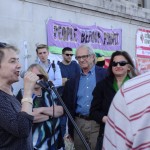“The necessity for the centralisation of the economy is at the root of everything, drawing all the socialist aims together. It draws all the socialist struggles towards a unity. The conscious and fraternal solidarity of the proletariat does a lot to help, but what spurs even the proletariat in the direction of this unity is the historic function of internationalism.” J Posadas, 20.5.1976, in “Proletarian Internationalism, the dialectical process of the class struggle and the construction of socialism“.
Jeremy Corbyn’s outlook contributes to anti-austerity organisation in Britain and worldwide.
Capitalism has become totally antagonistic with the needs of humanity – from the most basic, like the right to live. This shows in the millions displaced, trafficked, killed or forced out of their countries by imperialism. The murderous intent of the capitalist system shows in its nuclear encirclement of China and Russia, and its insolent abdication of any responsibility towards the continents it devastates, plunders, and prevents developing.
As capitalism sinks into economic, military and social criminality, the need for integrated anti-war and anti-capitalist United Fronts gets more pressing by the day. This is the case in Europe and the world. The welcome given to J Corbyn by mass currents in Britain is not just part of the transformation of the Labour Party. It is part of the ongoing transformation of the world, where technical and scientific progress strains towards a rational and integrated world economy. Individualist, predatory, cowardly and subjective, capitalism is incapable of this task; seeing that everything it does fails, like the EU, it turns viciously against the forces of progress, to silence them.
This is why the British capitalist class feels antagonism towards Jeremy Corbyn, and those who support him. Capitalism fears less the humanism of J Corbyn than the way he is becoming a beacon around which hundreds of thousands rally, against capitalist war and austerity. By the way it hates Corbyn, the capitalist class expresses its hatred and fear of the Trade Unions in struggle, the Labour and working class base, the growing community groups, anti-war, anti TTIP, anti-austerity, and peace movements – as well as Women, Green, Environment and Climate organisations, the various Communists, Left groups and left Labour currents that come together in strikes and huge demonstrations.
Capitalism has the technical capacity to produce for all, but capital accumulation confiscates from people the means to buy back their own goods. Capitalism has the solution to gluts: Make war. Destroy countries, destroy their wealth, destroy the goods and close production down. As capitalism ‘rebuilds’, it gives itself a new lease of life – but this criminal policy fills the masses with revolutionary confidence. The significance of the SNP in Scotland, Podemos in Spain and Syriza in Greece does not lie in their achievements so much as in the increasing disposition of the masses to shape politics and power themselves.

Leaders like Jeremy Corbyn rebel consistently against the US and British imperialism bombing countries because this has become unacceptable and abhorrent. The 2 millions in the streets against the war on Iraq proves the point. The ordinary Labour and working class people see that the fruit of their labour goes to smash countries, instead of building life. The stance of Jeremy Corbyn makes people feel heard, and their political abilities wanted.
THE BRITISH ELECTORATE DID NOT VOTE FOR FISCAL RESPONSIBILITY
In the view of the Tories, the only way is the capitalist way: the working class is not a class with its own opinions, its own fraternal vision of the future, and its own capacity to build a new society. Reality proves the opposite however. In actual reality, those responsible for the crisis are the banks, and not the people, as the Tories say. This irrationality reigns in the capitalist class, but it underpins also much of the Parliamentary Labour Party, and all the speeches of Kendall, Cooper, Burnham, Harman and others.
In John Cruddas’ view, for instance, (Labour MP for Dagenham&Rainham and former policy coordinator of the LP) “the electorate voted for fiscal responsibility” and “the Tories won because [… they] are trusted to manage the country’s finance. Labour is not”. But it is not true that the Tories won the elections. It is Labour that lost them – and lost because the population wanted nothing to do with “fiscal responsibility” from Labour. Most of the Labour ‘front-benchers’ lost their seats in those elections (May 2015), because they saw nothing wrong with finance capital being on State benefits on a grand scale.
It is not true that the Tories won “because they are trusted”. Nothing further from the truth! They won because they are trusted by their social class whilst the working class cannot trust Labour. When Tony Blair says that Corbyn as Labour leader will ‘annihilate’ the Labour Party, what does he thinks he has done?? What he fears is the annihilation of Blairite Labour, and the possible start of a Workers Party based on the Trade Unions. Corbyn wants the Labour Party to liberate the Trade Unions from their legal shackles (Thatchers’ – and yes, Blair’s). What troubles Blair is not the annihilation of Labour, but his own.
It is a falsehood to say that the Tories are “trusted to manage the country’s finances”! Millions are rallying to the ‘Jeremy Corbyn for Labour leader’ campaign precisely because they do not trust the Tories to manage the country’s finances. They want Labour to put people before profits.
BOURGEOIS THINKING IS SUBJECTIVE. THE WORKERS AND POPULATION ARE OBJECTIVE
What was called until recently “the public sector borrowing requirement” is based on government’s expenditure exceeding its income (hence ‘having’ to borrow). The yearly repayment of that debt costs £33 billion in interests alone, and growing, as the debt is not being repaid and grows every year.
The public sector, the public services, did not incur this debt. Few Labour leaders can accept this simple fact, but the masses can. They flock to Corbyn because he identifies clearly the financial culprits, and their wars.

How can the electorate ignore that its wages (behind the cashpoints), and then its public services, were both confiscated by the banks? How can the wage-earning electorate wish for “fiscal responsibility” in its Labour leaders???
Like the whole Labour structure and leadership, Cruddas’ thinking cannot rise above the prejudices of his class interests and subjectivity. He views the masses as the adjuncts of capital, infantiles and dependents, who have no other business in life but to bend the knee and select ‘electable’ MPs, ‘respectable’ in the eyes of the bourgeois class.
It is necessary to form anti-austerity, anti-capitalist and revolutionary currents in the Labour Party, to identify, confront and defeat the elements of the Labour bourgeois structures that protect groups like Progress, and keep the Labour and Trade Union base out of all major political decisions.
FOR THE CREATION OF SYSTEMATIC AND OFFICIAL LABOUR ANTI-AUSTERITY CURRENTS
The significance of J Corbyn is that he does not see the electorate as a dependent or an infantile. Through his 32 years of militant campaigning in defense of public ownership, for cooperatives and sharing, he has become trusted as someone who appreciates the fraternal disposition of the masses, their thirst for justice, as well as their collective and cooperative capacity to build society themselves.
Would-be Labour leaders like Kendall condemn Corbyn for his partiality to Clause 4 because they are afraid of workers’ power. They have no declared objection to capitalist exploitation, but they are quick to repudiate the collective ownership recommendation of Clause 4. Others, like Burham, may actually believe that capitalism still has some mileage – along with a career for himself, perhaps. Due to the origins and history of Labour, its structure is imperialist and most of its leaders are bourgeois. Over the years, Labour dropped its labour principles so completely that all sorts of movements now overtake it on the left. These movements do not mind Corbyn as Labour leader, but what they seek above all else is to impel him forward, and to show him their collective determination to organize nationally and internationally against austerity.
When Dave Ward of the CWU says that he favours Jeremy Corbyn “in order to cure the Labour party of the virus of Tony Blair”, he expresses the opinion of millions of Labour voters who run away from the Labour ‘virus’. The fact that the will of millions has found some representation in a Labour leader like Corbyn is not an accident. It shows that the conditions exist to start pushing the virus out of the Labour Party.
Dave Ward being a Trade Union leader, his declaration means also that conditions are improving for more working class power in the Trade Unions themselves. Strikes like those of the PCS* at the National Gallery show a very high level of political consciousness. The ongoing transport strikes bring RMT, Aslef, TSSA and Unite** together, in struggles that demand political leadership from the Labour Party. These strikes cast aside the accommodated sectors of the Trade Union leaderships, and encourage others out of their passivity. The firmness of the working class stimulates the masses to seek J Corbyn.
A powerful world process tends to unify Europe on the basis of a united fight against austerity. Deep down, J Corbyn is ‘popular’ because he is sensitive to this necessity passionately felt by the broad masses. He may not win the Labour leadership, but his stance facilitates the process that is moving in the direction of the socialist transformation of Labour, of the Trade Unions and of Europe.
*PCS – Public & Commercial Service Union.
** RMT, Aslef, TSSA, Unite – major Unions in the Transport Industry.
Posadiststoday, 16.8.2015


















